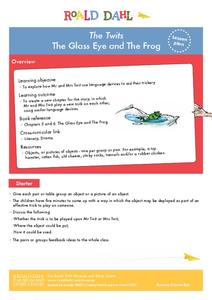Curated OER
Reflexive Verbs
A verb is reflexive when the subject and the object are the same. After introducing your intermediate Spanish speakers to some of the most common reflexive verbs, assign them this sheet for practice. First, they write the reflexive...
Mathematics Vision Project
Module 5: Modeling with Geometry
Solids come in many shapes and sizes. Using geometry, scholars create two-dimensional cross-sections of various three-dimensional objects. They develop the lesson further by finding the volume of solids. The module then shifts...
Research Parent
Universe Cards
A 9-page packet comes with 24 cards that have pictures and informational text about each object in the universe. From nebulae to dwarf planets, objects we see—or don't see—are represented in the cards through pictures and words.
Curated OER
As a Matter of Fact
Elementary-aged scientists discover that all matter has mass. They are shown the difference between mass and weight, and learn how to calculate mass using the appropriate tools and methods. The scientific method is used while estimating...
Curated OER
Iron For Breakfast
Third graders are challenged to use scientific thinking, they experiment and observe which objects are attracted to a magnet. Pupils use the evidence to construct an explanation as to what common property the objects attracted to a...
Mathematics Assessment Project
Estimating Length Using Scientific Notation
Would you rather have a million dollars or 1 x 10^6 dollars? To find the answer to this question, class members first complete an assessment task converting numbers between decimal notation and scientific notation. They then take...
Research Parent
Solar System Cards
Find all things solar system in a set of reference cards. Even Pluto makes an appearance! Each of the 24 cards has a picture and accompanying informational text that gives brief background about the object.
Curated OER
Narrow It Down
Ever played 20 Questions? A similar game helps young learners practice asking and answering yes-or-no questions. Spread out several objects, preferably all similar with slight variations (buttons or coins would work well). A leader...
Virginia Department of Education
Arithmetic and Geometric Sequences
Future mathematicians learn about arithmetic and geometric sequences, as well as common ratios and differences as they complete a worksheet matching sequences with the algebraic expressions that represent them.
Curated OER
Sorting Candy
Lower graders sort and group objects by their different properties. They watch a video about sorting then, sort and organize candy in different groups. Students compare how others sorted their candy. Finally, they decide which group has...
Exploratorium
Parabolas
A parabolic mirror toy demonstrates how concave mirrors objects reflect light and produce a realistic image at their focal point. This resource probably doesn't explain any more than the printed insert that accompanies such an apparatus...
Curated OER
Counting Mat
Using the provided counting mats (1-6 and 7-12) and small objects to count with, guide your young learners to match the correct number of objects to the written numeral and dots. Class members will either read the numeral and count out...
Perkins School for the Blind
Treasure Hunt
On, over, and under are some very common prepositions; but how can you teach these concepts to children with visual impairments? Here, is one way. Kids will practice following verbal commands as they go on a classroom treasure hunt. They...
EngageNY
First-Person Computer Games
How do graphic designers project three-dimensional images onto two-dimensional spaces? Scholars connect their learning of matrix transformations to graphic design. They understand how to apply matrix transformations to make...
Curated OER
Goody Bags
Looking for Common Core math center ideas for your Kindergartners? This a great one that is easy to set up, change up, and can be individualized to the learning level of each child. Start with a collection of zippered plastic bags...
TryEngineering
What is a Nanometer?
Exactly how small is a nanometer? Scholars investigate the scale of a nanometer by measuring classroom objects and converting these measurements to nanometers.
Roald Dahl
The Twits - The Glass Eye and the Frog
What do a pair of stinky socks and a toy hamster have in common? The third instructional activity in an 11-part unit designed to accompany The Twits by Roald Dahl uses silly objects to teach about figurative language. Zany pranks...
EngageNY
How Do 3D Printers Work?
If we stack up all the cross sections of a figure, does it create the figure? Pupils make the connection between the complete set of cross sections and the solid. They then view videos in order to see how 3D printers use Cavalerie's...
EngageNY
Modeling with Inverse Trigonometric Functions 1
Where should I stand to get the best view? Pupils use inverse trigonometric functions to determine the horizontal distance from an object to get the best view. They round out the lesson by interpreting their answers within context.
EngageNY
Computing Actual Lengths from a Scale Drawing
The original drawing is eight units — how big is the scale drawing? Classmates determine the scale percent between a scale drawing and an object to calculate the length of a portion of the object. They use the percent equation to find...
Curated OER
Character Nichos
This art lesson also incorporates a study Mexican and South American cultures and art. Students then create Nichos, which are small, decorated boxes commonly found in homes and public places, or displayed on walls or pedestals.
Curated OER
Chasing Metaphors
Students use metaphors in order to see commonly experienced objects, events, and people in new and more meaningful ways.
Teach Engineering
Floaters and Sinkers
Whatever floats your boat. Young engineers learn about density by measuring the masses and volumes of boxes filled with different materials. Using their knowledge of densities, they hypothesize whether objects with given densities will...
NOAA
Technology II
Ping, ping, ping. The last installment of a 23-part NOAA Enrichment in Marine sciences and Oceanography (NEMO) program explores technology use in marine studies, such as sonar. Activity involves simulating sonar techniques to identify a...























